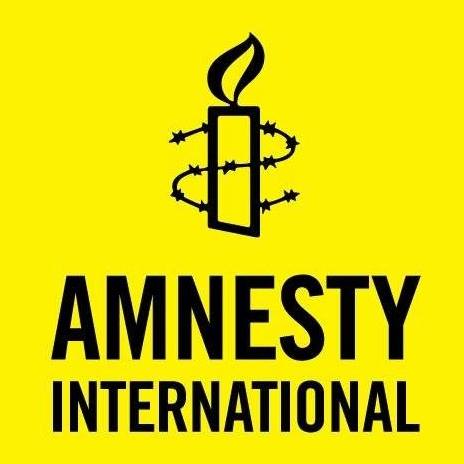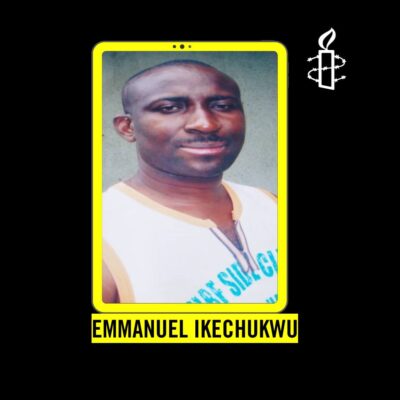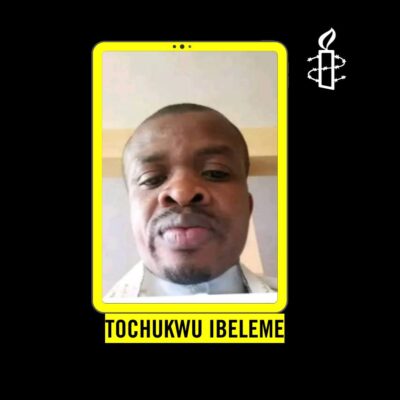
Enforced Disappearances in Nigeria: Amnesty International Calls Out Government Over Missing Citizens, From Nnamdi Kanu’s Abduction to Thousands Lost Since EndSARS
As the world’s attention fades, Amnesty International renews global outrage over Nigeria’s wave of enforced disappearances - from photographer Emmanuel Ikechukwu and trader Tochukwu Ibeleme in Aba to the abduction of IPOB leader Mazi Nnamdi Kanu and countless others silenced in the shadows of state power.
Nigeria’s deepening human rights crisis has once again come under the spotlight as Amnesty International raises alarm over a disturbing pattern of abductions, secret detentions, and enforced disappearances allegedly carried out by state security forces since 2020.
The rights organization’s renewed outcry follows the chilling accounts of Emmanuel Ikechukwu and Tochukwu Ibeleme, two men abducted in Aba, Abia State, over alleged ties to Indigenous People of Biafra (IPOB), and never seen again.
But their stories, Amnesty says, represent only a fraction of a much larger, more terrifying reality: a country where citizens vanish without a trace, families are silenced by fear, and justice remains elusive. The organization warns that Nigeria is “sliding dangerously into a regime of lawlessness where security agents operate beyond the reach of accountability.”
 On 8 July 2021, Emmanuel Ikechukwu, a well-known photographer and father of three, was abducted in broad daylight from his shop along Aba-Ngwa-Ngwa Road in Abia State. Eyewitnesses told Amnesty International that six masked, heavily armed men stormed the area around 3 p.m., wearing what appeared to be police uniforms and carrying AK-47 rifles.
On 8 July 2021, Emmanuel Ikechukwu, a well-known photographer and father of three, was abducted in broad daylight from his shop along Aba-Ngwa-Ngwa Road in Abia State. Eyewitnesses told Amnesty International that six masked, heavily armed men stormed the area around 3 p.m., wearing what appeared to be police uniforms and carrying AK-47 rifles.
“They came in a vehicle, about six of them,” said a resident who witnessed the incident. “They dressed like police officers but covered their faces. They picked him up, and we never saw him again.”
Weeks of frantic searches by his family yielded nothing. “We have gone to police stations and prisons to check if he is there, but he was not found,” one neighbor recounted. “He had a wife and three children as of the time he was abducted.”
 Just weeks before that, on 15 June 2021, Tochukwu Ibeleme, a 25-year-old trader and father of three, was also taken from his shop in Aba by seven masked men who arrived in a Hilux van. Witnesses said the abductors provided no explanation before disappearing with him. Despite months of inquiries and visits to multiple police stations, Tochukwu’s family has received no information about his fate or whereabouts.
Just weeks before that, on 15 June 2021, Tochukwu Ibeleme, a 25-year-old trader and father of three, was also taken from his shop in Aba by seven masked men who arrived in a Hilux van. Witnesses said the abductors provided no explanation before disappearing with him. Despite months of inquiries and visits to multiple police stations, Tochukwu’s family has received no information about his fate or whereabouts.
“I don’t know if Tochukwu is still alive,” said one of his friends who spoke to Amnesty International in Enugu. “We have searched everywhere.”
The case of Mazi Nnamdi Kanu, leader of the Indigenous People of Biafra (IPOB), underscores Amnesty International’s warnings about the Nigerian government’s disregard for international law. Kanu, a British citizen, was abducted in June 2021 in Kenya in a clandestine operation widely condemned as extraordinary rendition, a gross violation of international norms.
Despite court rulings declaring his detention unlawful and ordering his release, the Nigerian government has refused to comply. Kanu’s case exemplifies a broader pattern of state impunity, where legal orders are routinely ignored and citizens’ rights are trampled under the guise of national security.
Human rights experts say Kanu’s case and the silence of the International community has emboldened security agencies to act without restraint, leading to the disappearance of thousands of young men across the South-East accused of supporting IPOB or the Eastern Security Network (ESN).
“The enforced disappearance of Nnamdi Kanu set a dangerous precedent,” said one Amnesty researcher. “It signaled to state actors that they can abduct citizens, even across borders, without consequences.”
From EndSARS to the South-East Crackdown: A Pattern of Brutality
The abductions in Aba and the continued detention of Nnamdi Kanu are part of a larger trajectory of government repression that gained global attention during the EndSARS protests of October 2020. What began as a youth-led call to end police brutality spiraled into one of the bloodiest civilian crackdowns in recent Nigerian history.
Amnesty International documented how security forces opened fire on unarmed protesters at the Lekki Toll Gate in Lagos, killing and injuring dozens. The Nigerian government has repeatedly denied responsibility, dismissing the incident as “fake news,” despite overwhelming video and eyewitness evidence.
Since EndSARS, reports of arbitrary arrests, torture, and enforced disappearances have surged. In the South-East, hundreds of civilians have been rounded up in night raids, often labeled as “terrorists” or “IPOB members” without trial or evidence. Many never return.
“The same culture of impunity that allowed the EndSARS killings is now entrenched in the South-East,” Bayo Olukoya said. “When a state refuses to investigate itself, it gives its agents a blank cheque to kill, abduct, and torture.”
The Human Cost: Families Left in Darkness
For the families of Emmanuel Ikechukwu, Tochukwu Ibeleme, and thousands of others, the pain is unspeakable. Without bodies to bury or official confirmation of death, they live in what Amnesty calls “a state of permanent mourning.”
“He was a peaceful man, just doing his job,” said a relative of Emmanuel. “We only want to know if he is alive or dead. Is that too much to ask?”
The emotional and psychological toll of enforced disappearances is devastating. Children grow up fatherless, spouses lose their livelihoods, and communities live under constant fear of arbitrary arrest. Human rights lawyers say these disappearances violate multiple international treaties Nigeria has ratified, including the International Convention for the Protection of All Persons from Enforced Disappearance.
In the words of one grieving neighbour:
“They took him in daylight. We saw it happen. And yet, four years later, it’s as if he never existed.”
Amnesty International has urged the Nigerian government to immediately disclose the fate and whereabouts of all individuals arrested or taken by security agencies in the South-East. The organization insists that citizens have the right to know what happened to their loved ones and to see transparent records of all detentions and transfers conducted by the state.
It also called for independent and credible investigations into every allegation of enforced disappearance, arbitrary arrest, and extrajudicial detention. Amnesty emphasized that only impartial inquiries, free from political interference, can uncover the truth behind the growing number of missing persons across the region.
Furthermore, the group demanded accountability and justice for victims and their families, urging Nigerian authorities to prosecute those responsible for human rights abuses and ensure reparations for affected communities. Without justice, Amnesty warned, the culture of impunity will continue to thrive, deepening the nation’s human rights crisis.